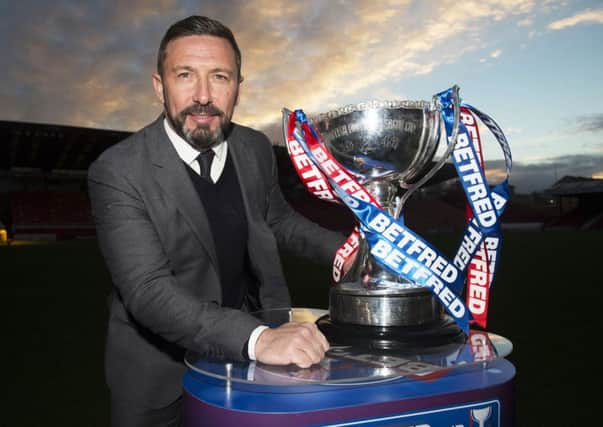Aberdeen boss wants his side to be more than one-hit wonders


As it stands, the Pittodrie club, comfortably Scotland’s outstanding team after Celtic in recent years, are currently lumped in with a number of one-hit wonders: Hibernian, Ross County, St Johnstone, Inverness Caledonian Thistle, St Mirren and Kilmarnock.
This is a list of teams who have won a cup since 2012, when Kilmarnock’s League Cup victory against Celtic kick-started a new, more democratic era in Scottish football.
Advertisement
Hide AdAdvertisement
Hide AdHearts won the Scottish Cup in 2012 but had won the same trophy recently enough to be considered in the same time frame. Celtic, along with the Scottish Cup in 2013, have now won five league titles in a row.
Aberdeen are now eyeing some distinction. If not quite earning immortality, a second major honour in just over two years will command special respect – particularly given the quality of side they need to overcome to earn this status.
The Pittodrie side took advantage of a new environment that included the denuded Rangers to secure their first major honour since the mid-1990s when winning the League Cup against Inverness in 2014. That triumph was described by McInnes, the Aberdeen manager, yesterday as “a crusade”. The countdown to the win was provided with a unique energy because there was so much hope invested in the possibility the club’s trophy famine was nearing an end.
Such a groundswell helped propel the club towards a victory as wildly celebrated as it was overdue. No one from the Dons’ point of view cared the match itself, which finished 0-0 and was eventually won by Aberdeen on penalties, was a dog.
McInnes was asked yesterday whether he had watched it again for inspiration in the run-up to Sunday’s Betfred Cup final, against Celtic. “You’ve got to be joking,” was the gist of his reply.
But he does appreciate that emulating what they did that afternoon is something that needs to be done if the current side want validation as one of the club’s best in recent times. In the lingo of the current day, their current record of one League Cup win (on penalties over Inverness) and two second-place finishes would seem a bit ‘meh’ otherwise. “I say this with all respect, any team can win a trophy,” said McInnes. “There’s teams won trophies and then been relegated the following year or been in relegation fights. You have to be good to win a trophy but it is over four or five games normally, and a lot of teams can put themselves in the position to be successful.
“I think what we’ve done as a team over the last few season is shown real consistency in the league as well as win a trophy.
“I do think there is good work being done on and off the pitch at the club at the minute. There’s good energy, good enthusiasm on and off the pitch. Looking back at this period in 25-30 years’ time, people will recognise that this was a good team. But for me a period or an era is synonymous with winning trophies and we’ll only really look back at this period if we can win more than one trophy.”
Advertisement
Hide AdAdvertisement
Hide AdAlex Smith, pictured left, was the last Aberdeen manager to take charge of a team that won more than one trophy, with the Pittodrie side winning both knock-out cups in 1989-90. Roy Aitken’s side won an enormously appreciated League Cup in 1995 but that era is more associated with the club’s decline. McInnes’ desire for his Aberdeen team to mark themselves out as special at Pittodrie is understandable, particularly given the enormous sense of history surrounding the club.
Their chances of success are helped by their underdog status this time around, and the fact the trophy famine has already been alleviated. “The one in 2014 was very important for us to cement that confidence within the team and within the city, and helped us push on,” said McInnes. “As I mentioned earlier, if we had not won it, it would have made everything that much tougher.
“There’s definitely a different feeling [this time] to the last one,” he added. “In 2014 after the semi-final at Tynecastle [against St Johnstone] there was a lot of pressure in the build-up to the final.
“It was almost like a crusade. It had been 19 years since the club won a trophy. There were people flying in from all over the world, the tickets were going mental and everything was snowballing. It was all everyone was talking about.
“We were huge favourites – rightly or wrongly – against a very good Inverness team, but there was a real need to win the game. With 44,000 in Celtic Park we could definitely feel that. It was so important for so many reasons. We had to get momentum and keep that feel-good factor going in the club.
“There had been a big improvement to what had gone on but the cup win was significant. If we hadn’t won it would have set us back. The supporters had watched other teams not of the stature of Aberdeen winning trophies and they were thinking ‘why not us?’ We just had to win.
“If we don’t win this game on Sunday it won’t stop us working hard to keep going and progressing. But if we do win it then it will help every aspect of the club, with the funding for the new stadium and for the new training ground. We’ve seen the energy it can bring to the club.”